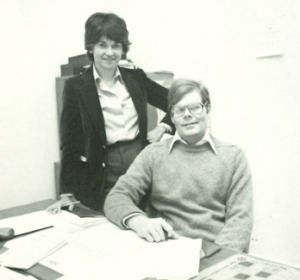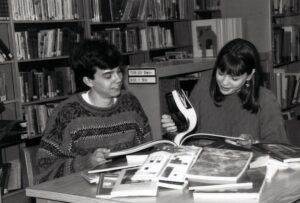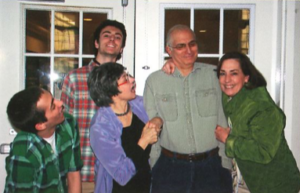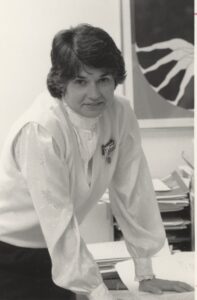Susan Marrs
I was hired at Hillsdale for a part-time English position in 1971. I worked Mondays, Wednesdays, and Fridays teaching American Lit to juniors and English electives to seniors. This was 1971, so it was still all girls in the Upper School. They were smart and chatty and engaging and open and warm and friendly. I thought it was great.
I joined a faculty with a lot of long-term teachers — many of them were single, older women who were very smart and very well-educated and who had given their lives to teaching at the school. I don’t know if those iconic teachers scared the students, but they scared me. Each of them was very certain that what she had to say was right, and they didn’t always agree. They were like knights on steeds, clashing in battle with armor clanking, but all the clashing and clanking was verbal. Nobody ever said anything actively rude to anybody else, but the tone of voice and the asperity with which comments could be delivered were powerful. I kept quiet.

What I remember about the merger is before it happened there had been the inevitable consultant, whose analysis was that there was a viable Cincinnati market for only two of the three independent schools currently operating — CPS, Hillsdale, and CCD — all of which were co-ed in their lower schools and single-sex in their Upper Schools. The consultant recommended that two of the three be combined, with the smallest of them essentially getting absorbed by one of the others. The kinder, gentler, more politically palatable way to affect a coming together was to present it as a merger, not an absorption. And that’s how it was presented to the faculties at Hillsdale and at CPS, even though Hillsdale was larger and CPS had some debt.
The merging of finances may have been easy, for all I know, but the merging of traditions was difficult. People asked each other, “How can we make this work for both of these student bodies? What traditions do we keep and what do we drop? We can’t keep all of them, there’d be no time to go to class!” I was an underling, so I was mainly listening to all of this, but things got a little testy among the faculty, at least for a while. We began to notice some student snippiness, a little, “Why should I listen to you?” directed at specific teachers. Finally, we were told in that first year that the former Doherty teachers were the only people who could discipline Doherty girls and the former Hillsdale teachers were the only ones who could discipline Hillsdale girls. By year three, I’d say, there was far less challenging of teachers from the other school, and more a feeling of, “We really are friends who go to the same school.”

One day, I was sitting in the office I shared with Dennis Reichelderfer, who taught history, when Neil Smith, the Head of Upper School, walked in holding a letter. He shook his head and said, “The guy we hired to be our new college counselor just sent me this letter saying he’s not going to take this job after all, so do you two want to do it?” This was August, probably too late to hire another experienced college counselor. Dennis and I looked at each other and said, “We teach seniors, so we know how to write recommendations. Why not!” And so, we did. In that far-less-stressful day, nobody — at least within our hearing — said, “These people don’t know what they’re doing. What are you doing giving them this job?”
How things have changed since then! The attitude used to be, go to college, find what you love, major in whatever appeals to you, and life will be fine. In those days, a huge portion of our graduates went to small liberal arts schools, mainly in the Northeast. Today, the majority of our kids say, I want a medium-sized school in a city, and I want a place where there are lots of good internships and research opportunities. The change came with the Great Recession of 2008. That’s when engineering and computer science shot through the roof. The economy and world events have played a dramatic role in what kids want for themselves and what families want for their kids. The college search tends to be more job and career and credentials oriented these days.

What’s special to me about Seven Hills — and this has always been true — is that as hard as it is to be an adolescent, I think it’s less hard here. At many, many high schools, you hear that to have any social capital, for a boy you have to be a jock, and for a girl, you have to be pretty. If you also have great grades, that’s well and good, although in some places maybe not because then you’re considered nerdy. At Seven Hills, it has always been true that kids have allowed each other and rewarded each other for great qualities well beyond the stereotypical. You can be a class star in the eyes of your age mates because you’re funny or because you’re in love with the environment or because you’re really sold on community service or because of any of a million other reasons. They’ve always given that to each other — that regard for individual talents and individual enthusiasms. Kids feel freer in this kind of atmosphere to really be who they are and explore the things that they’re interested in, not hide an enthusiasm because people might not think it’s cool.

I think working in a school like Seven Hills makes you a better parent and a more empathic human being because you witness the trials and tribulations and joys and successes of kids year after year after year. Upper School teachers gain a sense of the context of adolescence because they live with it every day. I’m sure the same is true for teachers of younger kids, too — that they come to deeply understand the challenges of the kids they teach. That context gives you an understanding and an acceptance and a perspective. Seeing kids make mistakes and learn from them, and then talk about what that felt like, makes you more empathic with them, and with people in general.

After former history teacher Mr. Turansky passed away, we got letters from nearly 100 of his former students, from his very first year of teaching to his last. And what they said, again and again, was: “Dear Mr. Turansky, you changed my life. You gave me a sense of how power works, and how and why to care for people who are the butt of other people’s power. And I went into my given field with that in mind.” It’s just stunning to read their letters. They talked about loving him. We are a school where students love their teachers and where the teachers love their students back.

